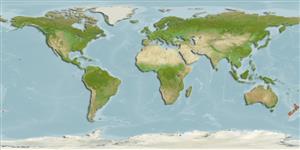Environment: milieu / climate zone / depth range / distribution range
Ecologia
marinhas bentopelágico; intervalo de profundidade 0 - 40 m (Ref. 127764). Temperate
Southwest Pacific: New Zealand. Due to a type-locality error, Bovichtus variegatus was wrongly applied to Australian specimens (Ref. 9002).
Tamanho / Peso / Idade
Maturity: Lm ? range ? - ? cm
Max length : 25.0 cm TL macho/indeterminado; (Ref. 9003)
Adults are commonly found in rockpools living within deep crevices and holes or under overhangs. They are rarely seen because of their nocturnal habits and camouflaged colour pattern. In some areas, small groups of thronfishes may be seen resting vertically or even upside down on rock faces. Diet consists exclusively of crabs and prawns. Juveniles are pelagic and distinguished by a silvery color pattern with vertical metallic and reddish brown bands (Ref. 9003).
Ciclo de vida ou comportamento de acasalamento
Maturidade | Reprodução | Desova | Ovos | Fecundidade | Larvas
Paulin, C., A. Stewart, C. Roberts and P. McMillan, 1989. New Zealand fish: a complete guide. National Museum of New Zealand Miscellaneous Series No. 19. 279 p. (Ref. 5755)
Status na Lista Vermelha da UICN (Ref. 130435: Version 2024-2)
Ameaça para os humanos
Harmless
Uso pelos humanos
Pescarias: sem interesse
Ferramentas
Relatórios especiais
Baixar XML
Fontes da internet
Estimates based on models
Preferred temperature (Ref.
123201): 10.3 - 21.7, mean 15.6 °C (based on 196 cells).
Índice de diversidade filogenética (Ref.
82804): PD
50 = 0.5044 [Uniqueness, from 0.5 = low to 2.0 = high].
Bayesian length-weight: a=0.01000 (0.00244 - 0.04107), b=3.04 (2.81 - 3.27), in cm total length, based on all LWR estimates for this body shape (Ref.
93245).
Nível Trófico (Ref.
69278): 3.6 ±0.3 se; based on size and trophs of closest relatives
Resiliência (Ref.
120179): médio(a), tempo mínimo de duplicação da população 1,4 - 4,4 anos (Preliminary K or Fecundity.).
Fishing Vulnerability (Ref.
59153): Low vulnerability (15 of 100).
